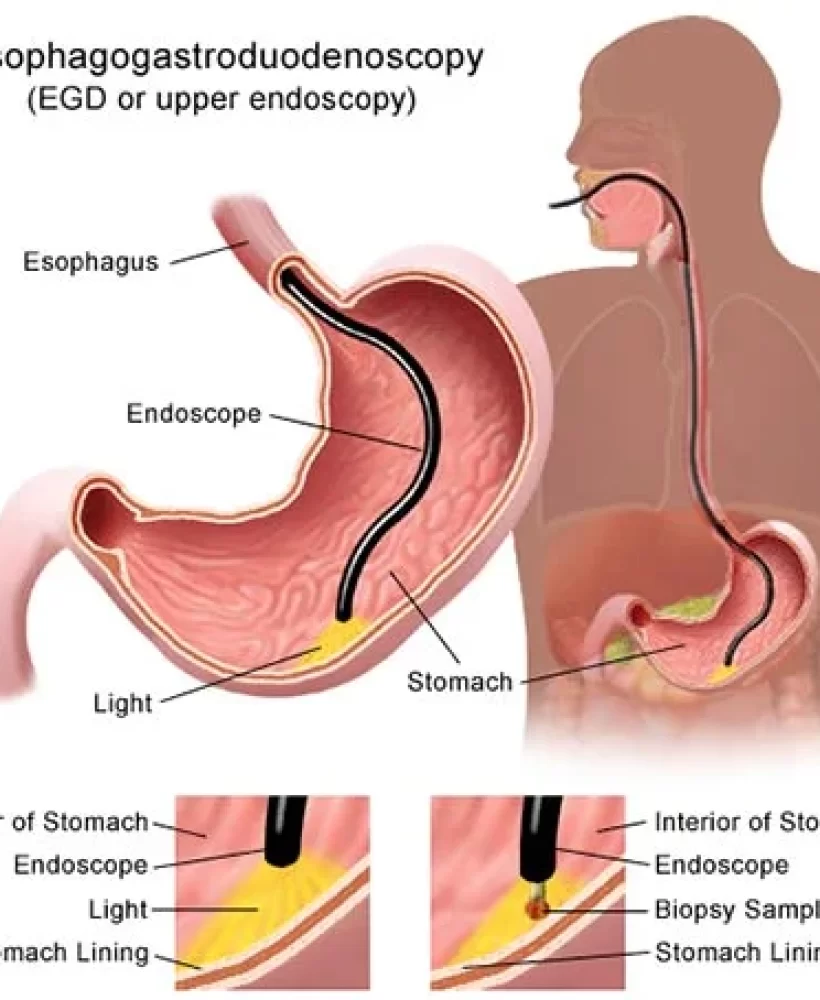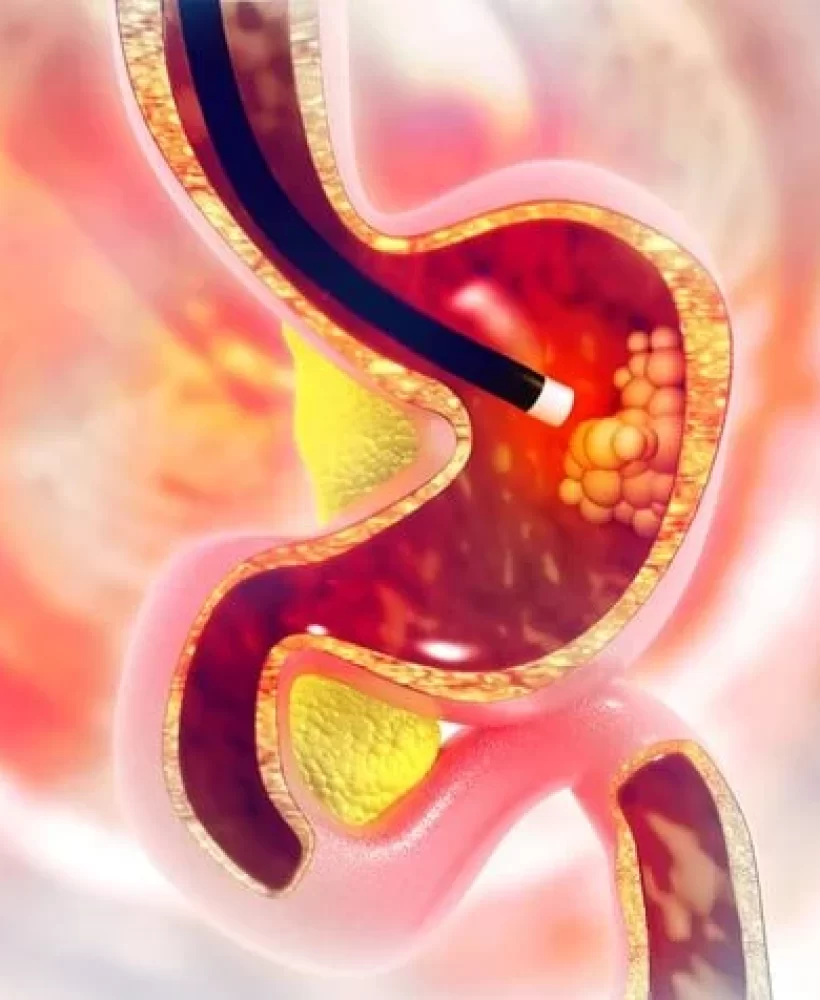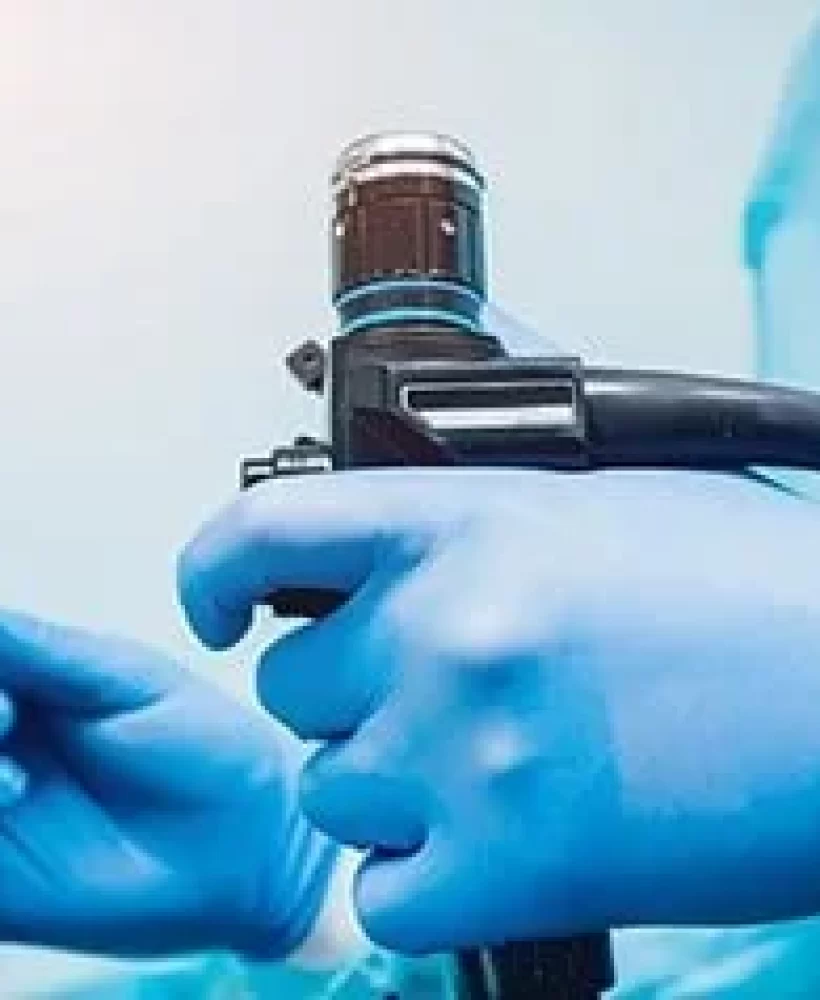Upper Endoscopy
- Procedures
- Upper Endoscopy

What Is an Upper Endoscopy and Why Is It Performed?
Upper endoscopy (EGD or endoscopy) is a non-surgical procedure our doctors use to examine a patient’s upper digestive tract. An endoscope is a flexible tube with a light and camera at the end that allows your doctor to view pictures of your upper digestive tract on a screen.
Endoscopy screening (including bowel cancer screening), diagnosis, and treatment for diseases affecting every part of the digestive system, from the upper esophagus, stomach, and small intestine to the colon, rectum, and anus, are all available at Midtown Endoscopy & Surgical Center.
The endoscope is a flexible, narrow tube about the size of a finger that is quickly passed through the mouth and throat and into the esophagus, allowing visualization of the esophagus, stomach, and upper part of the small intestine. This procedure is also known as esophagogastroduodenoscopy (EGD) and upper GI endoscopy. In our procedure rooms, we use cutting-edge, high-definition endoscopy equipment for optimal visualization of the GI tract, allowing for a precise and detailed exam. At Midtown Endoscopy & Surgical Center, we utilize this exam to accurately diagnose a wide range of digestive disorders.
Why Is It Important to Have an Upper Endoscopy, and What Will the Doctor Be Looking for During My Exam?
Upper endoscopy is the gold standard for visually evaluating the upper digestive tract. It helps diagnose digestive disorders, such as stomach pain, ulcers, reflux, anemia, upper gastrointestinal bleeding, weight loss, nausea/vomiting, and difficulty swallowing. The endoscope’s camera allows for direct visualization of the lining of the esophagus, stomach, duodenum, or small intestine lining.
In addition to visualization, our doctors can take biopsies of any abnormalities in the intestine lining, mass lesions, or any other abnormalities they detect. They may take biopsies, even if the lining appears normal to the naked eye, to diagnose infections such as H. pylori or to make a tissue diagnosis such as celiac disease or eosinophilic esophagitis.
Doctors can also use the endoscope to treat gastrointestinal bleeding or to remove foreign bodies if necessary. Upper endoscopy and other tests, such as blood work, imaging, etc., can help your gastroenterologist establish an accurate diagnosis and treatment plan for you.
Why Choose Midtown Endoscopy & Surgical Center for Your Endoscopy?
At Midtown Endoscopy & Surgical Center, we utilize cutting-edge medical technology, high-definition equipment, and imaging modalities to optimally visualize your bowel during your upper endoscopy to make a diagnosis and develop an effective treatment plan. Our facility has the necessary equipment to ensure the safety of your procedure while having your endoscopy performed. Our board-certified anesthesiologists will also be beside you throughout the surgery to ensure that you are comfortable and safe. Most importantly, our award-winning doctors will perform your procedure and help you get your desired answers.
Cleaning The Endoscope and High-Level Disinfection to Ensure Your Safety
At Midtown Endoscopy & Surgical Center, we utilize the Advantage Plus endoscopic reprocessing machine. The ADVANTAGE PLUS™ is a fully automated, computer-based asynchronous endoscope reprocessor that monitors each endoscope channel separately for blockage and proper flow, ensuring complete high-level disinfection. A computerized detection system eliminates human error in selecting and connecting hookups. It is a cutting-edge system designed to ensure your safety and the highest level of infection control. The device is placed on a unique hanger until the following procedure to avoid contact with other instruments or surfaces. We go to great lengths to ensure the safety of your procedure.


What Is the Preparation for the Procedure?
It is critical not to eat or drink anything before the procedure, even water. Typically, such fasting is necessary for 8 hours before your exam. It gives a clear visual field and helps prevent vomiting and aspiration, which is crucial for your endoscopy procedure at our facility. Certain medications, such as blood pressure medication, can be taken the morning before the exam with a small sip of water. Still, you should discuss all your medication regimens with your doctor.
What About the Medications That I Take?
Before treatment, you should discuss all medications you take with your gastroenterologist. Your doctor will advise you accurately if there is any reason to discontinue their use. Ensure to tell your gastroenterologist if you are allergic to any medications before performing an upper endoscopy. At Midtown Endoscopy & Surgical Center, we will gladly discuss this with you before your procedure.
What Can I Expect When I Arrive and Immediately Before the Procedure?
When you arrive at the office, the staff will check you in and complete the necessary paperwork and consent forms. You will then be led to your dressing room to change into your gown. The staff will ask you questions regarding your condition and the indications for the procedure, as well as make sure you are fasting adequately before the procedure. Your vital signs will be taken at that time, and any questions you may have will be answered.
Will I Receive Sedation?
After you’ve changed and checked in, our board-certified anesthesiologists will place an IV line in preparation for sedation for the procedure. The anesthesiologist will place oxygen and attach EKG electrodes to your chest for safe monitoring during the procedure. Sedation will make it easier for you to tolerate any discomfort, such as pressure, bloating, or cramping. Our board-certified anesthesiologists are always on hand to ensure your comfort and safety throughout the procedure. Because we give sedation, you will require a driver to take you home, which you must arrange ahead of time.
What Can I Expect During the Procedure?
The specialist will ask you to lie on your left side before beginning the procedure. To help numb your throat, you may receive a topical anesthetic that is either sprayed or gargled. Your doctor will place a bite block in your mouth to protect your teeth from the endoscope. It’s important to remember that the scope is not more significant than the food you’re swallowing, and it won’t interfere with your breathing. The anesthesiologist will then gradually administer the medication, making you sleepy.
The endoscope will then be inserted into your mouth and esophagus to examine the lining. During the exam, the anesthesiologist or an assistant may use suction to collect saliva, allowing you to avoid swallowing. The specialist may also pump air into your stomach to provide a better visual field. We use the most up-to-date high-definition imaging modalities to visualize your upper digestive tract during endoscopy best. Because you will be sedated, you may not feel pain or discomfort and will likely fall asleep.
What Is the Doctor Looking for During My Endoscopy and What Kind of Results Are Obtained?
During the procedure, our doctors use a high-definition video screen to control the endoscope’s movement and visualize the upper digestive tract. They carefully inspect the lining of your esophagus, stomach, and duodenum. If our endoscopy doctors discover an area that warrants additional investigation, they can insert instruments through the endoscope to retrieve a biopsy (a small tissue sample) for analysis. The sample will be sent to a laboratory to be distinguished between benign (non-cancerous) and malignant (cancerous) tissues. Biopsies can help identify many conditions. The doctor may take one, even if they don’t suspect cancer, to help diagnose other conditions.
Keep in mind that the doctor may take a biopsy for many reasons, even if cancer is not suspected. A biopsy, for example, can detect Helicobacter pylori, a bacterium that can cause ulcers. This test is generally well tolerated and causes no discomfort or pain. It also provides essential information to doctors to establish a proper diagnosis and treatment plan.
Upper endoscopy is the perfect tool for treating medical conditions in your upper gastrointestinal tract. The gastroenterologist can pass various instruments through the endoscope without discomfort. Upper endoscopy, for example, may be used to perform a cytology test, in which they pass a small brush goes through the endoscope to collect cells for later analysis. They can stretch or dilate a narrowed area, treat bleeding, or remove polyps, which usually are benign growths, from the lining of your gastrointestinal tract.
How Long Does an Endoscopy Take?
The procedure usually takes 15-20 minutes or less and is performed at our surgery unit. However, due to the time required for preparation and recovery, expect to spend two to three hours at the office. If you were sedated, you would need someone to drive you home after the procedure.
Recovering from an Upper Endoscopy
Our board-certified anesthesiologists are always on hand to ensure your comfort and safety during your procedure. The office staff will monitor your recovery until the sedatives wear off following the endoscopy. You may experience cramping, bloating, or nausea due to the air introduced into your stomach during the examination, but this should be brief. Before you are released, your doctor will explain what, if anything, they discovered, even though the results of any biopsies are not yet known. Again, because you have been sedated, you must have someone drive you home and stay with you until you are released. Even if you feel awake, your judgment and reflexes may be impaired for 12-24 hours. Unless we instruct you differently, you can eat after the procedure.
Endoscopy Complications
In general, endoscopy is a very safe procedure when performed by trained and experienced gastroenterologists. Complications are rare, but the most severe is a perforation, which may require surgery to repair. Other complications include bleeding from the site of a biopsy. Complications might cause severe abdominal pain, fever, chills, or rectal bleeding, among other symptoms. While these complications are rare, you should notify your doctor immediately if you notice them or any other symptoms that concern you. We would be glad to discuss this with you.
How many days do I need to take off work?
You will need to take the day off from work for the procedure.
How Long Do EGD Results Take?
Some results from an upper GI endoscopy are available on the same day as the procedure. However, the results can take 72 to 96 hours or longer if you’ve received a biopsy.
How Much Does an Upper Endoscopy Cost in New York?
The average cost of upper GI endoscopy in New York is nearly two thousand dollars. When a doctor orders an endoscopy, it is usually covered by insurance, but you must still meet your deductible and pay the copay or coinsurance. Without insurance, you will be responsible for the entire cost of the procedure, including doctor fees, prescriptions, and lab fees.
For more information about an upper endoscopy in NYC or to schedule an endoscopy appointment with one of our GI doctors, please contact our Midtown or Upper East Side NYC offices. As best-in-class gastroenterologists in NYC, we provide highly personalized and comprehensive care. Our philosophies regarding the doctor/patient relationship are based on trust and have earned us some of the most respected reputations in NYC.